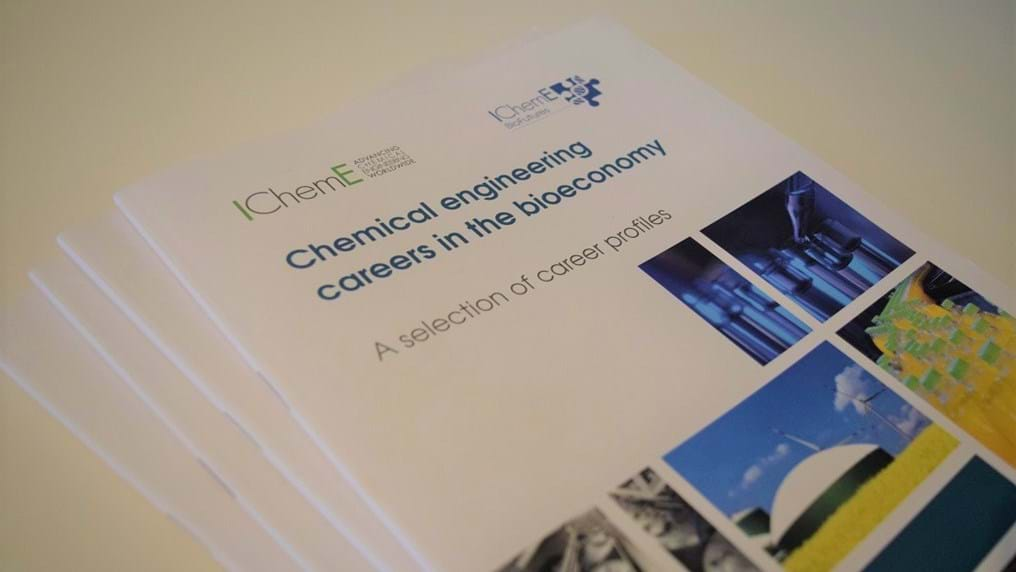New biosector careers profiles launched to inspire students

23rd April 2020
A new collection of chemical engineering career profiles has been launched by the Institution of Chemical Engineers (IChemE) to inspire the next generation into a prosperous career in the bioeconomy. Showcasing how chemical engineers in this emerging sector are helping to tackle some of the biggest challenges facing society, the careers profiles illustrate the relevance of the profession to young people currently choosing a career path.
Chemical engineering careers in the bioeconomy: A selection of career profiles has been produced by top chemical engineers in the sector who are leading IChemE’s BioFutures Programme.
The programme, set up in 2017, aimed to assist the development of IChemE’s work in the biosector as a learned society and highlights the importance of biochemical engineering careers and skills. This booklet of career profiles was produced by the Careers Working Group within the BioFutures Programme following on from its final report.
The booklet profiles 21 IChemE members - ranging from early career to executive and board leaders - working in bioprocess design and manufacturing, energy, food and nutrition, health and wellbeing, and water.
It provides an excellent teaching and careers guidance resource for those in higher education to understand the expansive career opportunities in the bioeconomy.
It also offers insight for chemical engineering undergraduate students looking for industrial placements and employment, while being a useful resource for companies linked to the biosector looking to support their professionally qualified engineers and newly qualified graduates in broadening their skills.
Dr James Winterburn, Chair of the Careers Working Group within IChemE BioFutures Programme, said:
“Chemical engineers working in the biosector have expertise that makes them uniquely placed to make a real difference to major global challenges, such as the production of safe, reliable and sustainable food and water supplies; manufacturing life-saving drugs and therapeutics; and finding alternatives to reduce dependence on fossil fuel energy sources to achieve net zero targets.
“Many young people may be unaware of the opportunities available to them when looking to study a degree or apprenticeship in chemical engineering. This career profile collection will not only really help students make more informed choices about their studies, but will help them when applying for placements, and graduate opportunities. We hope these career profiles inspire chemical engineers at all career stages when looking for progression and skill development based upon the paths these professionals have taken.”
IChemE will continue to review and expand the range of the careers profiles to ensure their continued relevance. If any member would like to share their career experiences or contribute ideas on how IChemE can improve its support to members in the biosector, they should contact chemengmatters@icheme.org
To request a printed copy of the careers profiles booklet*, email chemengmatters@icheme.org
To download a digital copy of the booklet, visit www.icheme.org/biofutures
*Please note: IChemE offices are currently closed due to the coronavirus (COVID-19) outbreak. Any requests for printed booklets will be dealt with as soon as possible upon return to the office and therefore there may be a delay for printed booklets to be received.
Links
Chemical engineering careers in the bioeconomy: A selection of career profiles
Contact
For more information please contact:
Rachael Fraser, Communications Executive, IChemE
t: +44 (0) 1788 534435
e: rfraser@icheme.org
Ketna Mistry, Communications Executive, IChemE
t: +44 (0) 1788 534484
e: kmistry@icheme.org
What is chemical engineering?
Chemical, biochemical and process engineering is the application of science, mathematics and economics in the process of turning raw materials into everyday, and more specialist, products. Professional chemical engineers design, construct and manage process operations all over the world. Oil and gas, pharmaceuticals, food and drink, synthetic fibres and clean drinking water are just some of the products where chemical engineering plays a central role.
IChemE
The Institution of Chemical Engineers (IChemE) advances chemical engineering's contribution worldwide for the benefit of society. We support the development of chemical engineering professionals and provide connections to a powerful network of around 35,000 members in 100 countries.
We support our members in applying their expertise and experience to make an influential contribution to solving major global challenges, and are the only organisation to award Chartered Chemical Engineer status and Professional Process Safety Engineer registration.
More information: www.icheme.org